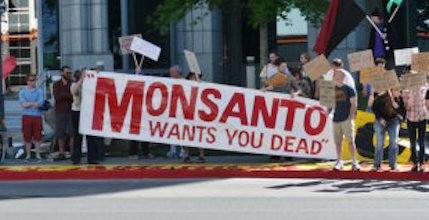Monsanto Is Suing California for Trying to Inform People That Roundup Causes Cancer
The biotech giant would prefer it if people didn’t know that glyphosate, the main ingredient in its bestselling weedkiller Roundup, is a probable carcinogen.
Once again, Monsanto is trying to take away our right to know, this time about carcinogenic chemicals used in household products and places all around us. In January, Monsanto filed a lawsuit against the state of California for its intent to list glyphosate, the main chemical used in Monsanto’s flagship Roundup herbicide, under California’s Proposition 65, a law that mandates notification and labeling of all chemicals known to cause cancer, birth defects or other reproductive harm, and prohibits their discharge into drinking waters of the state.
Enacted by California voters via ballot initiative in 1986, Prop 65 prohibits any business from knowingly or intentionally exposing any individual to a chemical known to the state to cause cancer or reproductive toxicity without first giving a clear and reasonable warning, and the discharge of such chemical into a source of drinking water is prohibited. The State relies on the findings of the International Agency for Research on Cancer (IARC) of the World Health Organization (WHO) — the world’s leading authority on cancer — as the basis for listing chemicals that are known or probable carcinogens under Prop 65. In 2015, IARC concluded, by a unanimous decision, that glyphosate is “probably carcinogenic.”
IARC categorizes cancer risk into groups based on the evidence: glyphosate was categorized as Group 2A (“probably carcinogenic”), so the evidence implicating glyphosate was found to be less strong than that of smoking or asbestos (Group 1, “carcinogenic”), but stronger than that of DDT, parathion or infection with type 2 HIV virus (all Group 2B, “possibly carcinogenic”). California subsequently issued the notice of intent to list glyphosate as a Prop 65 chemical based on the IARC finding. In its lawsuit, Monsanto is challenging the State’s use of the IARC listings, claiming that it is unconstitutional for a State agency to rely on findings from an International organization, no matter how well respected that organization is (one of IARC’s major funders is the U.S National Institute of Health, as well as the U.S. Environmental Protection Agency).
IARC wasn’t the first agency to look at glyphosate’s cancer-causing potential. In 1985, EPA classified glyphosate as a possible carcinogen based on experiments showing tumors in glyphosate-treated rodents. Input from Monsanto led to a dubious reinterpretation of these studies by EPA, and reclassification of glyphosate as non-carcinogenic in 1991. Glyphosate is used on residential lawns, parks and farms across the state, meaning California residents face high levels of exposure; glyphosate residue has been found in the urine of farmers and farm workers, and has even been found in blood. If Monsanto is successful in this litigation, Californians could be deprived of knowing about the cancer-causing potential of glyphosate.
Today, Center for Food Safety (CFS) filed a legal motion to intervene in this important case. CFS was one of the first public interest organizations to raise awareness about how the use of glyphosate in Roundup Ready crop systems fosters herbicide-resistant weeds and increases the use of the herbicide and the detrimental effects associated with it, and has repeatedly sought to prevent the planting and approval of glyphosate-resistant, genetically engineered crops through federal litigation. As such, CFS seeks to intervene in this case in order to defend the listing of glyphosate under Prop 65 and protect the public’s right to know when it is being exposed to cancer-causing chemicals. None of these protections would be required should Monsanto succeed in its move to prevent California from listing glyphosate under Proposition 65.
Monsanto, along with other chemical corporations, has also been fighting to block mandatory state and federal labeling of genetically engineered foods for years. Their lawsuit is yet another example of the company’s continued commitment to denying consumers’ right to know.

